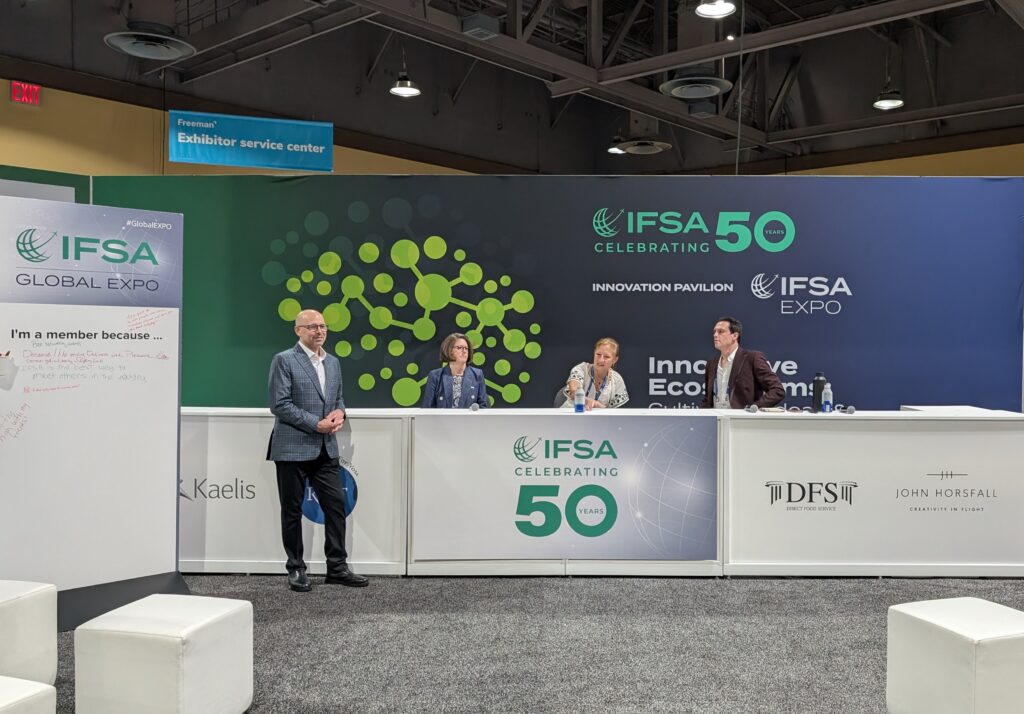Airlines Navigate Complex Path to Greener Cabin Services
Share
Industry leaders gathered at the IFSA Global EXPO in Long Beach to discuss the challenging transition toward more sustainable in-flight services. They revealed the complex web of operational, financial, and environmental trade-offs airlines face in pursuing greener operations.
The panel, featuring representatives from Virgin Atlantic, United Airlines, and Hawaiian Airlines, highlighted how the industry’s approach to sustainability has rapidly evolved.

Virgin Atlantic’s trial of reusable cups exemplifies the complexities of transitioning to more sustainable items. Paul Mills, Head of In-Flight Services, revealed that while well-intentioned, the initiative faced practical hurdles: increased fuel burn due to heavier items, reduced galley space, and additional washing infrastructure requirements. The airline has since focused on other sustainability initiatives, successfully eliminating over 90% of its single-use plastics since 2019.
The regulatory landscape presents another significant challenge. Holly Armstrong on United Airlines pointed out that regulations are often inconsistent across jurisdictions and sometimes outpace available solutions, leaving airlines struggling to comply. “The regulation is ahead of the technology and the solutions,” she explained, highlighting the need for more coordinated international standards.
Hawaiian Airlines’ unique geographical situation offers a striking example of sustainability’s complex nature. Paula Jansen, the airline’s Catering Manager, described how being 2,500 miles from the nearest mainland creates distinctive challenges in sourcing sustainable alternatives. More surprisingly, she revealed an unexpected paradox: Hawaii’s electricity comes from burning trash, meaning successful recycling initiatives could potentially increase electricity costs for local residents.
Technology is enabling innovation in waste reduction. United Airlines has implemented AI-driven solutions to optimize provisioning, achieving significant weight reductions across its fleet. “We’ve been taking off about 61 pounds reduction on a lot of our flying,” Armstrong noted, demonstrating how sustainability initiatives can align with operational efficiency.
The discussion also revealed tensions between standardisation and brand identity. While industry-wide standards could improve recycling and reuse programs, airlines face pressure to maintain distinctive brand experiences. “We’ve got to be unique; we have to have an identity,” Jansen emphasised, though she suggested compromises might be possible through standardised materials with customised designs.
Looking ahead, the industry appears to be moving toward a more nuanced view of plastics in aviation. “Plastic isn’t bad. We’re trying to get away from single-use plastic,” Jansen noted, suggesting future solutions might focus on reusable plastic items that benefit from the material’s lightweight properties while avoiding single-use waste.
Financial considerations remain crucial, particularly regarding infrastructure investments. Airlines are exploring partnerships with catering providers to fund necessary facility upgrades, recognising that sustainable solutions require collaborative approaches. As Paula Jansen noted, “If we have a big ask for them, we’re also going to have to stand behind it.”
The panel clarified that while airlines are committed to sustainability, solutions must balance environmental benefits with operational realities. Pre-ordering systems, waste reduction technologies, and innovative partnerships are emerging as key strategies, but the path to truly sustainable in-flight services remains complex.
As the industry evolves, airlines face mounting pressure from regulations and customers to deliver more sustainable solutions. However, as this discussion revealed, the challenge lies not just in identifying greener alternatives but in implementing them at scale while maintaining operational efficiency and customer satisfaction.


